|
||||||||||
| Home Nation World Business Opinion Lifestyle ChinAfrica Multimedia Columnists Documents Special Reports |
|
||||||||||
| Home Nation World Business Opinion Lifestyle ChinAfrica Multimedia Columnists Documents Special Reports |
| Current Cover Story |
| Open for Business |
| The First CAETE is expected to take China-Africa trade relations to new heights as role players seize abundant opportunities |
| By Xia Yuanyuan | VOL.11 July ·2019-06-27 |
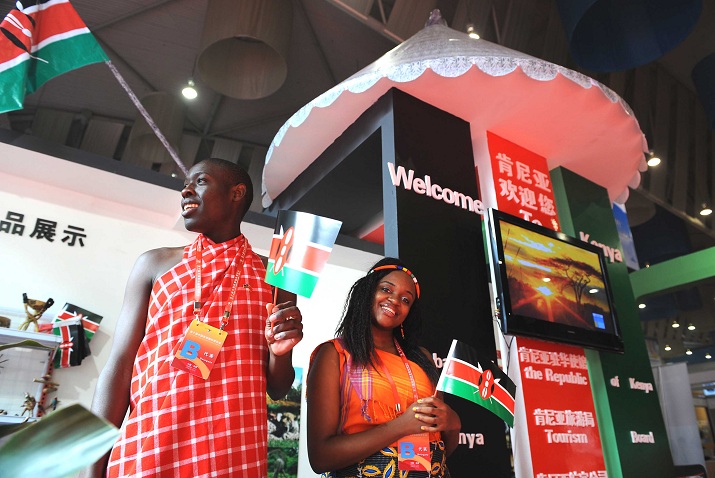
Two Kenyans at an international fair held in Chengdu, Sichuan Province, in 2009 (XINHUA)
Changsha in central China’s Hunan Province takes on a distinctive African flair at the end of June when thousands of delegates visit the city to attend the First China-Africa Economic and Trade Expo (CAETE) - all in the search of business opportunities.
One of the delegates, Tamba Keyaka Anga, an official from the Ministry of Forestry and Wildlife of Cameroon, has been waiting for the expo so that he could look for Chinese partners to buy new machinery.
According to Anga, construction equipment is urgently needed in Cameroon to build infrastructure such as buildings and roads.
“[We choose Chinese companies] because, instead of just doing business, they teach us how to use and operate [the equipment] and they are more efficient,” Anga told ChinAfrica.
Launched under the framework of the Forum on China-Africa Cooperation (FOCAC), the First CAETE, with an estimated display space of 50,000 square meters including national pavilions and display areas for enterprises, will showcase economic and trade opportunities in China and African countries, according to the organizing committee. The expo, held in the capital city of Hunan Province between June 27-29, is expected to be attended by more than 1,500 foreign guests, over 5,000 domestic guests, as well as more than 3,500 exhibitors, buyers and professional visitors.
Fruitful achievements
In 1999, 14 African countries traded with China with trade value exceeding $100 million. The top four countries were South Africa, Egypt, Nigeria and Angola.
In order to further the bilateral exchanges, the mechanism-based FOCAC was established in 2000. Thanks to the strong promotion of FOCAC, China-Africa economic and trade cooperation has achieved rapid and all-round development since then.
In 2009, China surpassed the United States to become Africa’s largest trading partner, and has done so for 10 consecutive years. Today, Africa has become China’s third largest overseas investment market and the second largest overseas project contracting market.
On June 4, 2019, China’s State Council held a press conference on China-Africa economic and trade cooperation and the upcoming First CAETE. Vice Minister of Commerce Qian Keming told the media that China-Africa trade cooperation remains stable.
According to Qian, China-Africa trade has been growing steadily, reaching $204.2 billion in 2018, up 20 percent year on year. China’s investment in Africa has also seen strong growth, as the ministry’s data show that more than 3,700 Chinese companies had set up branches in Africa by the end of 2018, bringing over $46 billion in investment to the continent.
“Cooperation in emerging sectors has also begun, as Chinese financial institutions have set up over 10 branches in Africa, and eight African countries, such as South Africa, have included Chinese currency renminbi (RMB) in their foreign exchange reserves,” said Qian.
China has also established an RMB clearing arrangement with Zambia and signed a local currency swap agreement with four countries, namely, Morocco, South Africa, Egypt and Nigeria.
New business cooperation such as cross-border e-commerce cooperation has also grown rapidly. In 2018, the Rwandan Government and Alibaba Group, China’s biggest e-commerce company, launched the first Electronic World Trade Platform (eWTP) in Africa to promote trade and tourism between China and Rwanda.
Experts believe that China has been playing an irreplaceable role in accelerating economic growth in Africa. Its huge demand has boosted prices of African export-related products. In addition, funds, personnel, management skills and technologies from China have helped resolve or alleviate many of the bottlenecks that hinder Africa’s development, especially in infrastructure construction.
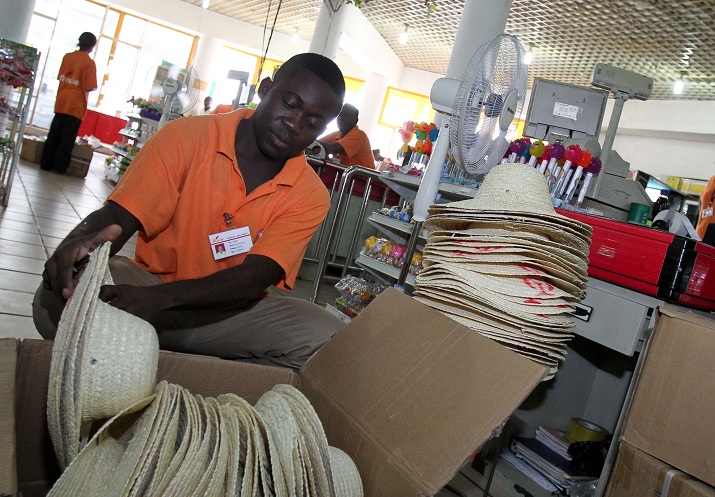
A local employee works in a Chinese supermarket in Brazzaville in the Republic of the Congo on March 11, 2013 (MENG CHENGUANG)
Hunan represents the epitome of booming development in China-Africa trade.
According to He Baoxiang, Vice Governor of Hunan Province, Hunan’s economy used to depend on agriculture, so the province has a lot of experience to share with Africa.
He said in the past, cooperation between China and Africa was mainly driven by the Chinese Central Government and large state-owned enterprises. Since the establishment of the FOCAC in 2000, more local governments, small and medium-sized enterprises (SMEs), and private businesses have joined in, and this expo will push forward this trend.
“Africa is home to diverse agricultural products, but it is weak in related processing industry, which needs the participation of not only large companies, but also SMEs,” he said. “Food processing is an industry worth more than $144.7 billion in Hunan, thus our companies can find many opportunities in Africa.”
The story of Hunan Province and African countries can be traced back to over 40 years. Before 1962, people believed tea could not be planted in Mali due to its natural conditions of drought coupled with high temperatures. However, the arrival of Shen Jieguo, former Researcher of Hunan Tea Research Institute, changed this perception. Shen successfully planted Hunan tea in Mali, and, in the process, raised the curtain of Hunan’s story with Africa.
Over 40 years later, the ties between the two sides are sound, and economic and trade cooperation has achieved significant results.
Since 2015, Hunan has hosted economic and trade activities such as the African Envoys Visiting Hunan, Hunan-Africa International Industrial Cooperation Conference & Business Cross-Border Networking Event and Hunan-Africa Local Industrial Cooperation Event for four consecutive years. Some African heads of state, more than 30 African ministers, and over 20 African ambassadors to China have visited the province.
Since 2005, imports and exports between Hunan and African countries have maintained an annual growth of more than 20 percent on average. In 2017, bilateral trade volumes reached $2.1 billion, a seven-fold increase over 2005, according to the Department of Commerce of Hunan Province.
With the encouragement of local government, Hunan enterprises further explored the African market. Enterprises in Hunan like the Valin Group, Longping Hi-Tech, Zoomlion, and Sany Heavy Industry covering agriculture, machinery, manufacturing industry and technology have accessed the African market.
This has helped boost Hunan’s trade with African countries, which totaled $2.8 billion in 2018, according to He. Contractual investment by Hunan companies in Africa amounted to nearly $1 billion.
Great expectations
Hunan enterprises place great expectations on the First CAETE. They regard it as a window to gain a better understanding of African market.
CAETE will be a platform for us to communicate with African partners face to face and share cross-border trade insights,” Peng Hui, General Manager of International Sales Co. of Sany Heavy Industry, told ChinAfrica, adding that it is an important opportunity for the Hunan companies to see more possibilities in the continent.
Nonofo Molefhi, Botswana’s Acting Minister of International Affairs and Cooperation, said Botswana will utilize platforms such as the CAETE to showcase products and attract investments. He said his country regards China as a strategic partner in development and hopes to see China’s enhanced participation in Botswana’s economic diversification.
“Botswana is open to investment to boost industrial capacity and facilitate the transfer of much needed skills and technologies,” Molefhi said.
Mawien Makol Ariik, Spokesperson of the Ministry of Foreign Affairs of South Sudan, the youngest country in Africa, said that his government and business officials are set to participate in the First CAETE in an effort to woo investment.
“This is a good opportunity for us South Sudanese because we will have the opportunity to inform [decision-makers] that South Sudan is working hard to achieve durable peace and it is safe for doing business,” said Ariik.
The expo will establish a new mechanism for economic and trade cooperation between China and African countries. It will spotlight cooperation in manufacturing, agriculture, infrastructure and emerging sectors such as finance and cross-border e-commerce, according to Li Chenggang, Assistant Minister of Commerce of China.
In search of trade balance
According to Qian, during the 18 years from 2000 to 2017, African countries had been in deficit for eight years while the Chinese side had been in a deficit for 10 years. “Overall, the trade between China and Africa is relatively balanced and healthy,” said Qian.
The Chinese Government has made a lot of effort to promote trade balance between China and African countries and encourage the entry of some African products into China by implementing a tariff-free policy in 2005. At 2018 FOCAC Beijing Summit, China made the decision to allow 33 least developed African countries to benefit from the zero-tariff policy for 97 percent of their products exported to China. This is also helpful for Chinese enterprises to reduce their own costs and expand options for imports.
In 2018, Chinese President Xi Jinping announced that China would support African countries in participating in the First CIIE and the least developed African countries participating in the expo would be exempted from paying exhibition stand fees.
According to Qian, in the future, China will offer more assistance, including holding specialized goods exhibitions, allowing broad-base African exports to China, and helping African nations build more manufacturing facilities and diversify their economic structures and sales channels.
(Comments to xyy@chinafrica.cn)
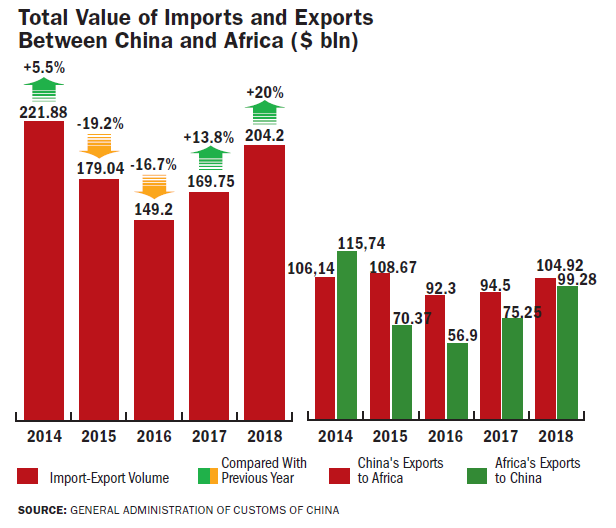
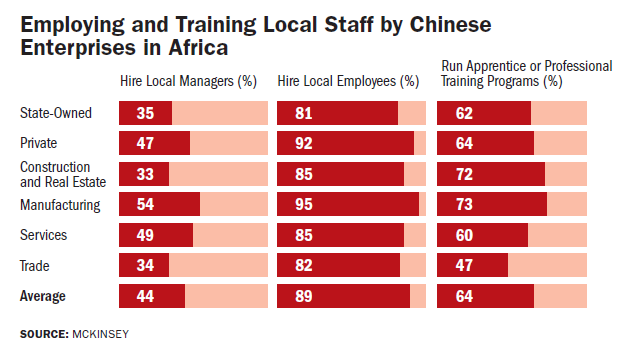
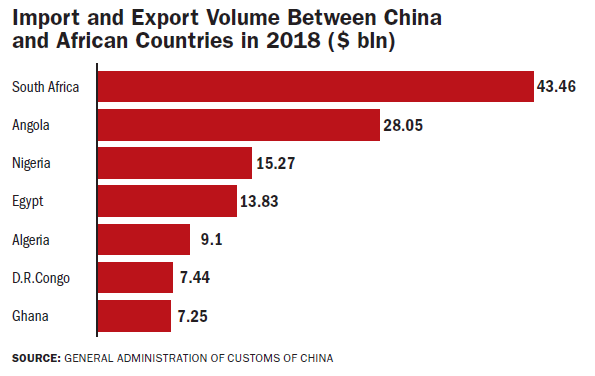
| About Us | Contact Us | Advertise with Us | Subscribe |
| Copyright Beijing Review All rights reserved 京ICP备08005356号-5 京公网安备110102005860号 |